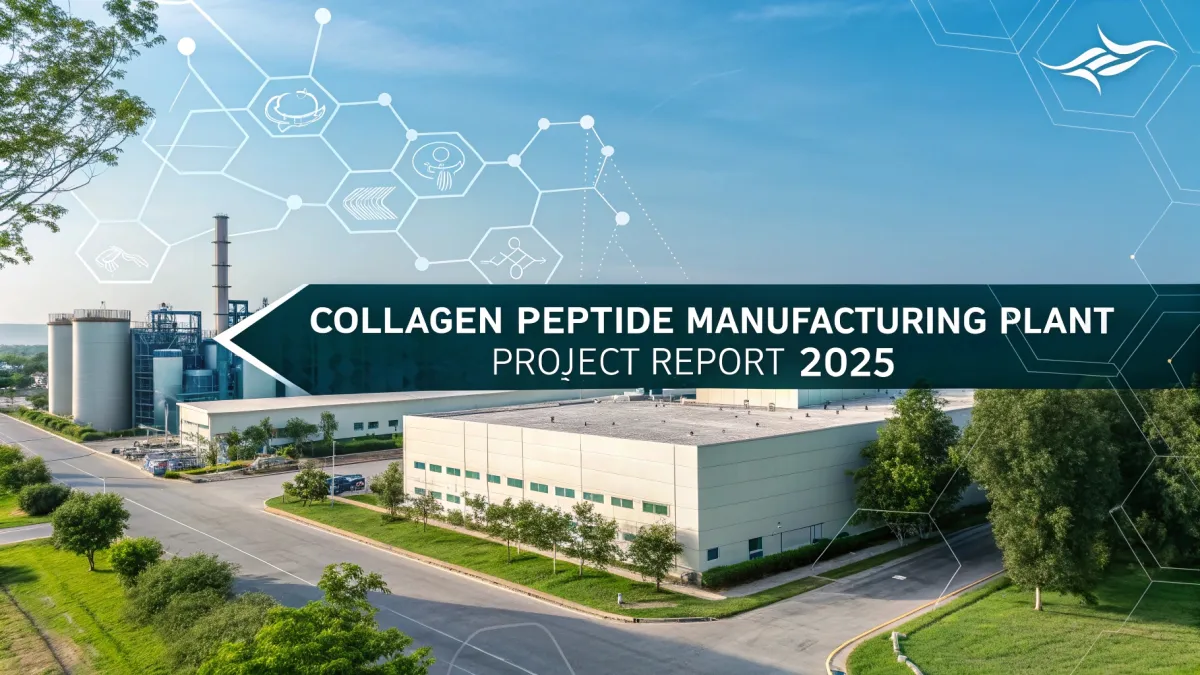
Collagen Peptide Manufacturing Plant Report 2025- Setup Details, Machinery Requirements And Cost Analysis
Setting up a collagen peptide manufacturing plant requires investment in raw material sourcing, hydrolysis and filtration equipment, drying systems, quality testing laboratories, and packaging facilities, along with strict compliance to food safety and regulatory standards..
IMARC Group's report, titled “ Collagen Peptide Manufacturing Plant Project Report 2025: Industry Trends, Plant Setup, Machinery, Raw Materials, Investment Opportunities, Cost and Revenue,” provides a complete roadmap for setting up a collagen peptide manufacturing plant. It covers a comprehensive market overview to micro-level information such as unit operations involved, raw material requirements, utility requirements, infrastructure requirements, machinery and technology requirements, manpower requirements, packaging requirements, transportation requirements, etc.
Request for a Sample Report : https://www.imarcgroup.com/collagen-peptide-manufacturing-plant-project-report/requestsample
Collagen Peptide Industry Outlook 2025:
The collagen peptide industry outlook for 2025 highlights strong growth, driven by increasing demand for functional foods, dietary supplements, and skincare products. Rising consumer focus on health, anti-aging, and fitness is boosting market expansion across both developed and emerging economies. Technological advancements in extraction and processing are enhancing product quality and applications, while sustainable sourcing from marine and alternative sources is gaining traction. Despite challenges such as raw material availability and regulatory scrutiny, the industry is expected to maintain steady momentum, supported by growing adoption in pharmaceuticals, nutraceuticals, and cosmetic formulations worldwide.
Key Insights for Collagen Peptide Manufacturing Plant Setup:
Detailed Process Flow:
-
Product Overview
Unit Operations Involved
Mass Balance and Raw Material Requirements
Quality Assurance Criteria
Technical Tests
Project Details, Requirements and Costs Involved:
-
Land, Location and Site Development
Plant Layout
Machinery Requirements and Costs
Raw Material Requirements and Costs
Packaging Requirements and Costs
Transportation Requirements and Costs
Utility Requirements and Costs
Human Resource Requirements and Costs
Capital Expenditure (CapEx) and Operational Expenditure (OpEx) Analysis:
Project Economics:
-
Capital Investments
Operating Costs
Expenditure Projections
Revenue Projections
Taxation and Depreciation
Profit Projections
Financial Analysis
Profitability Analysis:
-
Total Income
Total Expenditure
Gross Profit
Gross Margin
Net Profit
Net Margin
Key Cost Components of Setting Up a Collagen Peptide Manufacturing Plant
-
Raw Materials – Procurement of bovine, porcine, poultry, or marine collagen sources
Machinery & Equipment – Hydrolysis reactors, filtration units, spray dryers, and freeze-drying systems
Quality Control & R&D – Laboratories for testing bioactivity, purity, and compliance with safety standards
Energy & Utilities – Significant power and water consumption for enzymatic hydrolysis and drying processes
Labor & Expertise – Skilled biotechnologists, engineers, and quality assurance teams
Packaging & Storage – Facilities for bulk and retail packaging, along with climate-controlled storage
Regulatory Compliance – Certifications for food safety, GMP, and international export standards
Economic Trends Influencing Collagen Peptide Manufacturing Plant Setup Costs 2025
-
Rising Health & Wellness Demand – Growth in nutraceuticals and functional foods markets
Sustainability Trends – Increased costs for eco-friendly and traceable sourcing practices
Raw Material Supply Fluctuations – Dependence on animal and marine by-products impacting pricing
Global Trade Dynamics – Export opportunities influenced by tariffs and international regulations
Technological Advancements – Investment in advanced processing methods for higher yield and purity
Government Incentives – Policy support for food innovation and pharmaceutical-grade production
Request for Customized Report: https://www.imarcgroup.com/request?type=report&id=13600&flag=E
Challenges and Considerations for Investors in Collagen Peptide Manufacturing Plant Projects:
-
High Capital Investment – Substantial funding needed for advanced biotech equipment and facilities
Regulatory Barriers – Stringent compliance with food, pharmaceutical, and cosmetic safety standards
Raw Material Dependence – Vulnerability to livestock, poultry, and fisheries supply fluctuations
Market Competition – Growing number of established nutraceutical and cosmetic ingredient suppliers
Consumer Preferences – Rising demand for sustainable, halal, and vegan alternatives influencing product development
R&D Intensity – Continuous innovation required to maintain competitiveness and expand applications
Conclusion:
The collagen peptide industry in 2025 is positioned for sustained expansion, driven by increasing consumer demand for health, nutrition, and beauty-enhancing products. Establishing a collagen peptide manufacturing plant presents significant opportunities but requires substantial investment in advanced processing technology, quality assurance, and sustainable sourcing practices.
While challenges such as regulatory compliance, raw material dependency, and competitive pressures persist, the industry's growth trajectory remains strong. Investors who prioritize innovation, eco-friendly practices, and alignment with evolving consumer preferences will be well-placed to capitalize on the expanding global market for collagen peptides.
About Us:
IMARC Group is a global management consulting firm that helps the world's most ambitious changemakers to create a lasting impact. The company excel in understanding its client's business priorities and delivering tailored solutions that drive meaningful outcomes. We provide a comprehensive suite of market entry and expansion services. Our offerings include thorough market assessment, feasibility studies, company incorporation assistance, factory setup support, regulatory approvals and licensing navigation, branding, marketing and sales strategies, competitive landscape, and benchmarking analyses, pricing and cost research, and procurement research.
Contact Us:
IMARC Group
134 N 4th St. Brooklyn, NY 11249, USA
Email: sales[@]imarcgroup.com
Tel No:(D) +91 120 433 0800
United States: (+1-201971-6302)
Legal Disclaimer:
MENAFN provides the
information “as is” without warranty of any kind. We do not accept
any responsibility or liability for the accuracy, content, images,
videos, licenses, completeness, legality, or reliability of the information
contained in this article. If you have any complaints or copyright
issues related to this article, kindly contact the provider above.


















Comments
No comment